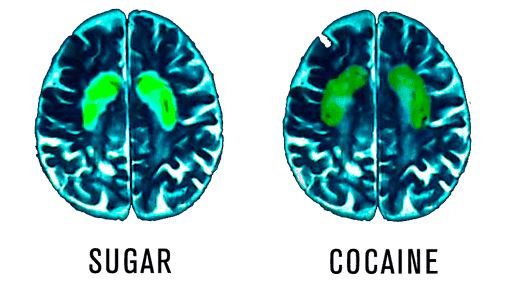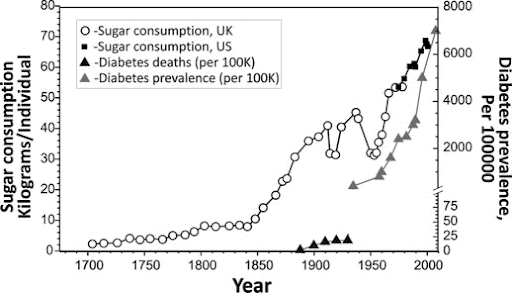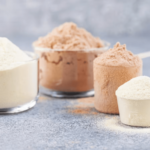
Molly Farrell
BSci majoring in Psychology, PGDp in Health Science
We all like to have something sweet (most of us on a daily basis), and that especially relates to our brain since sugar has been a part of our reward system ever since the caveman days.
However, over-consumption of sugar leads to a myriad of health issues. Now, studies have shown that our brain reward system prefers sugar over cocaine, which means that sugar is potentially more addictive than cocaine.
Today we will understand why this is so and how over the last few decades our sugar consumption has increased to epidemic proportions.
The History of Sugar
The journey of sugar production was first established in India over 2000 years ago. Originally consumed as a fine spice, it has become one of the largest forms of trade in the modern world.
It was during the Medieval era when sugar production techniques moved beyond India. The Middle East adopted sugar craft and not soon after, Europe too was abundant in sugar.[1]
The 1400’s was a game changer. Europe acknowledged sugar as a profitable commodity, and the production of sugar became significant revenue to their trade. Unfortunately, it had a huge part in the colonial slavery of the time. This meant that sugar was a luxury for the elite.[1]
Over centuries, sugar trickled down the hierarchy and became an every-man consumable, and by the 1800’s sugar was Britain’s most valuable import.
Initially sugar had its place in tea and coffee, but it didn’t take long for processed foods to take the stage and the production of confectionery and chocolates were very well received.
This brings us to where we are today, consuming high levels of sugar in many different forms.[1]
Is Sugar More Addictive than Cocaine?
The effects of sugar, it’s addictive qualities and our brain’s reaction to this compound has become a common trend within medical literature.

The attention towards this substance has gone to such lengths that researchers quite happily suggest sugar is more addictive than cocaine. But are these claims plausible and on what grounds can we compare these substances?
Sugar and the Brain - The Reward Circuit
It is no secret we love sugar. We consume it daily and based on the statistics around diabetes, heart conditions and obesity, the everflowing health concerns around our relationships with sugar are warranted.
RELATED — Diet and the Brain: Our brain on sugar

We are accustomed to consuming sugar. Not only is sugar consumed with sweet treats, but sugar is also jammed into almost all food groups. Take a can of tomatoes for example; more often than not, it is loaded with processed sugars.
RELATED — Sugar in plant-based products: Are we eating processed or natural sugar?
There is a reason we crave sugar because our bodies are designed to. When we take a bite of a cookie, our taste receptors are activated and through a line of communication in our brain, we are told to do it all over again. This is called the mesolimbic dopamine reward system.[2]
This cycle shows us how the brain is designed to reward us when we consume sugar. We can observe this reward circuit through light imaging.
One key player that lights up in this circuit is the nucleus accumbens. Not only do we see this reward circuit light up with sugar, but it is that same nucleus accumbens illuminated by drugs, sex and money.[3]
Caveman Days and sugar as the reward
Taking us back a “couple million years”, this system made great sense. In the caveman days food was scarce and sugar was needed. In order to motivate us to seek sugar, the positive reinforcement from this dopamine system was vital.[4]
Nowadays, we have a huge issue. We no longer face the same scarcity of food and for most of us our accessibility to sugar goes above and beyond what our bodies need. Our reward system combined with our current food environment is creating issues.[4]
So, can we finally say that we are becoming addicted, and moving away from evolution to revolution in sugar addiction?
Should Sugar be classified as a controlled substance?
The dopamine system already places our relationship with sugar in a similar bracket to our relationship with drugs.[5]
Some even push this claim to suggest our reward system for sugar surpasses that of cocaine.[6] This idea has been explored through our classifications of addiction as established by the American Psychiatric Association in the DSM-5 (Diagnostic and Statistical Manual of Mental Disorders).[7]
There are 3 ways we can classify addiction:
- Bingeing
- Withdrawals
- Cravings
All of these three classifications can be applied to sugar.
A sugar binge is pretty normalised these days and having a calorie dense meal loaded with sugar is very easy to come by.
Sugar proves to act differently to other foods where we seek a certain pleasure enabling us to eat very high volumes.[5]
Withdrawal is another big indicator, as sugar activates our opiate receptors as we experience our reward.[5] Unfortunately, once we go up, we must come down. For some individuals this can create hormone imbalances, headaches and uncontrollable cravings.[5]
These characteristics of sugar make our intake troubling and difficult to reduce.
What are our limits for sugar intake?
Sugar holds addictive qualities. Whether we can say it is more addictive than cocaine is still up in the air. What we do know for certain is that we need to increase our awareness of how and what we consume.
Sugar is hidden in almost everything and our brains are sensitive structures. The way we eat sugar has become so habitual and we are generally unaware of our reliance.
An average person should not consume more than 30 grams of sugar per day, which is equivalent to 2 tablespoons. At the moment, our average intake is 75 grams or 60-80 kilograms of sugar consumed per year. This is 20 times more than in the 1700s.[8]
RELATED — A Guide to Mindful Eating
The way we crave sugar is going beyond what our bodies need, and with the accessibility we have to sugar our reward circuits are going into overdrive. Establishing healthy limits can be challenging but being aware of our own habits is a great place to start.
However, sometimes that’s easier said than done, which is why we would suggest that you join us and Subscribe to our Newsletter. That way, we can nudge you in the right direction with new and interesting research and articles on health.
Mental Health and Wellness Advocate
With extensive experience as a mental health support worker, Molly knows first hand the impact our mind can have on our physical, emotional and social wellbeing. She has completed a Bachelor’s of Science, majoring in Psychology, and a postgraduate diploma in Health Science, which gives her an opportunity to combine theoretical knowledge with practice.
Molly’s goal and focus is to provide others with education and awareness on how we can improve our mental wellness and of those around us.
References
(1) Ballinger, R.A. (1971). A History of Sugar Marketing. U.S Department of Agriculture, Economic Research Service, 1971. Indian University. https://books.google.co.nz/books?hl=en&lr=&id=_8s78V8FdNAC&oi=fnd&pg=PR4&dq=history+of+sugar&ots=4IE4wq_rEQ&sig=iSut459Z_K5wX70pUkryVZaTYNQ&redir_esc=y#v=onepage&q=history%20of%20sugar&f=false
(2) Alonso-Alonso, M., Woods, Stephen, C., Pelchat, M., Grigson, P.S., Stice, E., Farooqi, S., San Khoo, C., Mattes, R,D & Beauchamp, G.K. (2015). Food reward system: Current perspectives and future research needs. Nutrition reviews, 75(5), 296- 307. https://www.researchgate.net/publication/276122355_Food_reward_system_Current_perspectives_and_future_research_needs
(3) De Jong, J, W., Vanderschuren, L. J & Adan, R. A. (2016). The mesolimbic system and eating addiction: what sugar does and does not do. Behavioural Sciences, 9, 118-125. https://www.sciencedirect.com/science/article/pii/S2352154616300638
(4) Wiss, D.A., Avena, N & Rada, P. (2018). Sugar Addiction: From Evolution to Revolution. Front Psychiatry, 9, 545. https://www.ncbi.nlm.nih.gov/pmc/articles/PMC6234835/
(5) Avena, N.M., Rada, P & Hoebel, B.G. (2008). Evidence for sugar addiction: Behavioural and neurochemical effects of intermittent, excessive sugar intake. Neuroscience Behavioural Review, 32(1),20-29. http://ncbi.nlm.nih.gov/pmc/articles/PMC2235907/
(6) Lenoir, M., Serre, F., Cantin, L & Ahmed, S,H. (2007). Intense Sweetness Surpasses Cocaine Reward. PLoS ONE, 2(8). https://journals.plos.org/plosone/article?id=10.1371/journal.pone.0000698
(7) American Psychiatric Association. (2013). Diagnostic and statistical manual of mental disorders (5th ed.). https://dsm.psychiatryonline.org/doi/book/10.1176/appi.books.9780890425596
(8) Blake, J. S. (2021). How much sugar does the average person consume every year? | Carbohydrates. Sharecare. https://www.sharecare.com/health/carbohydrates/sugar-consume-every-year





